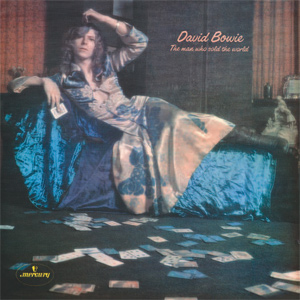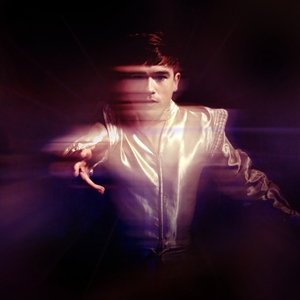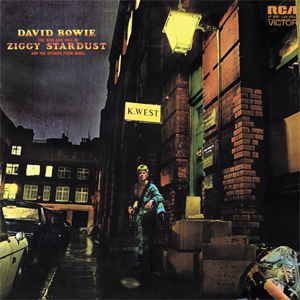Sunday, 5 May 2024
The Last Dinner Party - "Prelude to Ecstasy" (2024)
Friday, 7 July 2023
Queens of the Stone Age - "In Times New Roman..." (2023)
In Times New Roman... follows this turbulent period and is evidently shaped by it, being quite a brooding and jaded record following up on the themes of the impermanence of the world and the people in it established on 2013's stellar ...Like Clockwork. The record as a whole feels much like an amalgamation of Queen's work since Lullabies To Paralyse. It has the sinister and creepy atmosphere from that album, Era Vulgaris' wonkey and weird production, the themes and art rock elements from ...Like Clockwork, and even incorporates some of the glam rock camp from Villains.
Obscenery sets the scene with scrappy guitar led verses leading into cinematic string-laden choruses. The chunky, lopsided production of the song leads you into the albums uneasy and distrustful world, always keeping you just a little bit on edge. This leads into the thrashing rager of Paper Machete. The track is the simplest on the record, being a straightforward alt rock banger akin to some of the bands big hits from the naughties. Time & Place plays with dual time signatures and results in a super groovy and driving tune that spirals into a hypnotic trance. Carnavoyeur is the big cinematic centrepiece of the record, with spooky synths, dramatic vocals and soaring strings. What The Peephole Say is the most tongue in cheek song on the record. It's a cheesy glam throwback song and is just an absolute blast. It would probably fit more at home on Villains with how much lighter it is compared to the rest of the album, but its just so much fun. The record cumulates with its 9-minute behemoth closer, Straight Jacket Fitting. The song encapsulates the albums atmosphere perfectly, progressing through a messy and stumbling first section into a swaggering blues rock second part which slowly phases into a dramatic and anthemic string-backed third portion before circling back to the wonky and uneasy first part, before a final moody acoustic guitar passage closes the album out.
Even the weaker tracks on here have some really interesting ideas and moments that I love, even if the whole tracks don't fully come together. Negative Space has a great chorus reminiscent of the ones on ..LC, as does the lead single Emotion Sickness. "People come and go on the breeze / For a whole life? Possibly..." is one of the best lines on the whole record. Sicily is an incredibly dynamic song with a really creepy atmosphere and only really needs a bit more of a memorable hook to draw me in. And finally, Made to Parade is quite a sluggish plodding song (clearly emulating a parade march) and doesn't do much for me, until about 2/3 of the way through it changes key into its climax, which hits like a truck and I absolutely love.
In Times New Roman... is another good record from Queens, who's releases never really dip too much in quality. Its broody and sinister, and a little bit cynical and definitely hits the mark for me as a whole package. Not every individual moment is the best the band has ever been (both Songs for the Deaf and ...Like Clockwork take a lot of beating), but is still a really solid record on the whole. And the circumstances surrounding the creation of the record are also worth discussing, as regardless of what the truth of what happened during the divorce, there is a longstanding culture of sweeping problematic issues under the rug, particularly involving established rockstars with a legacy and influence (Go look up the 70's LA "baby groupie" scene). Anyway, that's a bit of tangent - the QOTSA album is good.
Top Tracks: Obscenery, Paper Machete, Time & Place, Carnavoyeur, What The Peephole Say, Straight Jacket Fitting
7/10
Tuesday, 1 November 2022
Muse - "Will Of The People" (2022)
Simulation Theory saw the band appearing to take themselves less seriously after the pretty self-righteous anti-war Drones, but was paired with incredibly predictable and tired 2010's pop rock and synthwave revival tropes that made the album really forgettable in my opinion. Will Of The People, on the other hand, amps up the pomposity (and honestly tackiness) of the band's glam rock and hard rock leanings, which when matched with their weakest written lyrics to date, make it certainly more entertaining on an ironic level than the bands 2010's output. But when actually switching your brain on and looking at the framing of the lyrics and themes (in the music and the interviews surrounding it), it's pretty obvious the band were aiming this to be one of their most grounded albums. This in itself isn't necessarily a problem but becomes one when looking at the connotations that the writing has, and no amount of irony can deflect from it.
Take the opening cut, the title track, for example. The song is this really gaudy and tacky glam rock rehash with cock-rock guitars and ridiculous choral chanted backing vocals. When I first heard it, I did kind of like it on an ironic level, it was so ridiculous that it was entertaining. But the song is apparently very similar to Marylin Manson's Beautiful People (I say apparently because I have never heard this song as I didn't like MM even before he has been revealed to be an sexual, emotional and physical abuser and I'm certainly not giving him a pittance of my money now to verify it). It's questionable that any artist would want to crib so heavily from someone with so many corroborating allegations against them, but a band with such raw technical talent on a song that is literally about fighting oppression is in such bad taste that no amount of irony can save it.
The following track, Compliance, is the same combination of beige synth pop and generic, 'anti-oppression' lyrics that filled Simulation Theory. After this is Liberation, which is the most blatant Queen rip off the band has ever sounded, and is also about (you guessed it) fighting some non-specific oppressor. The next song, Won't Stand Down, is the lead single and was teased by Matt Bellamy to be a return to the heavy, metal influenced side of the band that they haven't shown since the early 2000s. And it does indeed have a heavy alt-metal riff during the post-chorus, but it also has some of the tackiest lyrics on the album and absolutely horrendous Imagine Dragons style plinky plonky synths and booming, obnoxious synth bass hits during the verses. Kill Or Be Killed is a much better 'heavy' song and generally one of the better tracks on the album, generally sticking to a more standard alt-metal style and featuring lyrics that aren't so obviously crap. However, as much as it compares well to the rest of the album it pales in comparison to the likes of Stockholm Syndrome and Reapers from the band's back catalogue. The track doesn't really have any interesting progression to it, it feels like just five minutes of various disconnected riffs bolted on to each other.
While most of these songs are just kind of tacky and bad, the truly tastelessness of the record rears its head again in Ghosts (How Can I Move On). The song is a somewhat insipid piano ballad about the loss of a partner during the pandemic. It is important to note that this isn't a personal song (as Bellamy did not lose his partner during the pandemic), and it clearly shows. The lyrics are utter trite, and read like a GCSE creative writing piece about grief. It's just filled with banal platitudes like "How can I move on?" etc with no real identity or anything. What really irks me about the song is that 'The Great Reset' is mentioned in the chorus. Bellamy is putting dumb political / conspiracy theorist jargon in a song that is supposed to be so incredibly personal and heartfelt. It shows that the band's supposed attempt to be more grounded in real world topics on the album is nothing more than an aesthetic to lace their usual vague "Us verses Them" lyricism. And when so much trauma has been caused by the topics they reference on the album, it really does leave a bad taste in the mouth. So many people have been in the position that this song is supposed to be reflecting, and I guarantee you not one of them is thinking about 'The Great Reset' when grieving a loved one.
Similarly, Verona is a song about forbidden love, with lyrics quite obviously alluding to viruses and masks and social distancing. Yeah the song reads like an anti-mask song. However its clear that the Bellamy isn't trying to deny the existence of the virus, the song acknowledges "the contagion on our lips". In fact the love interest dies at the end of the song, so Bellamy isn't trying to sell it as some government conspiracy. So maybe it's supposed to be ironic, taking the piss out of anti-maskers? But Bellamy's falsetto crooning set against chiming guitars and slow, arpeggiated synth lines implies the song is supposed to be taken wholly seriously. This once again leads to the only conclusion being that the band are only using this current political discourse as an aesthetic to lace over a SparkNotes retelling of Romeo and Juliette. Which again is pretty tasteless considering the amount of people who have been killed by Covid. The closer, We Are Fucking Fucked, reinforces this idea. The song pointlessly lists of references to global events over the past few years (wildfires, world wars, viruses etc) with absolutely no commentary beyond Bellamy's comical bellowing "We are fucking fucked". It's nihilism with no point, that teenage angst where you think your cleverer than the world around you just because you've noticed how shit everything is and you think nobody has ever realised that before you. Yes Matt, we are 'fucking fucked', and?... The song also rehashes a half formed version of the Knights Of Cydonia riff, to show how bereft of ideas it is both lyrically and musically.
The only song here that is remotely enjoyable is You Make Me Feel Like It's Halloween. The track is as gaudy and over the top as the rest of the album, however it's the only one that it's clearly not meant to be taken seriously. The cheesy, funky synth bass and spiralling electric organ are just a lot of fun. It's clearly meant to be a dumb, silly Halloween song and that's what it is. However it feels so odd plonked in the middle of an album that is as equally as ridiculous as it, but completely unintentionally. Here are a load of really bad, tacky, cheesy (and sometimes tasteless) songs that are supposed to be some kind of political commentary, and then a cheesy, novelty Halloween song.
Its hard for me to say which of the past two Muse albums is worse. Simulation Theory was badly written, musically dated on arrival and just plain boring; whereas WOTP is tacky, tasteless and somewhat problematic - although it's certainly going to stick in my memory much longer than ST ever did.
Top Tracks: You Make Me Feel Like It's Halloween
3/10
Wednesday, 31 March 2021
David Bowie - "Diamond Dogs" (1974)
So next up in the David Bowie discography is Diamond Dogs, where Bowie eschews from the Ziggy Stardust / Aladdin Sane character concept for an entirely new character, world and concept. The record was originally conceived as a musical adaptation of George Orwell's 1984, although his estate denied Bowie the rights to the novel. The idea was then reworked into Diamond Dogs, a post-apocalyptic concept album featuring the character Halloween Jack, a roller-skating, rogue, anti-hero who roams the rooftops of devastated Manhattan with his gang called the 'Diamond Dogs'. Musically, the record is somewhat transitional for Bowie; being still firmly rooted in glam rock territory, but with hints of the funk and soul music which would become centre stage of Bowie's next releases.
Diamond Dogs is unfortunately the first Bowie record that I've talked about here that hasn't really connected for me, due to a couple of reasons. Most prominently, the premise and concept feels clunky and underdeveloped. Some of the songs refer directly to 1984 as Bowie had already written some tracks before asking for the rights, and they feel awkwardly smooshed together with the Halloween Jack / Diamond Dogs ideas. This means neither element is really explored in great detail. The 1984 stuff feels like just a scant retelling of the book, and the album doesn't really explore who Halloween Jack is or what the world he lives in is like. The way the album is presented doesn't help these issues. The opening track is a dramatic spoken word intro, multiple tracks run into each other, and the whole album feels so grandiose that it makes it seem like it's about something. But the lyrical content doesn't really back this up and makes the whole record seem pretty pretentious.
The second issue for me is that the songs just aren't very memorable. The only truly vital Bowie track on the record is Rebel Rebel, which is one of his finest, catchiest and coolest songs ever. The chugging riff and Bowies charismatic swagger combine to make such an effortlessly cool tune. The other tracks are just unremarkably okay. The other more traditional glam rock songs feel very generic and by the numbers, and the other songs don't really work outside of the record due to generally being quite short and heavily involved with the albums story. And considering that the story and themes of the record don't really land, its ultimately detrimental to the tracks which are composed well with interesting elements to them. I'd say aside from Rebel Rebel, the run from Sweet Thing to Candidate to Sweet Thing (Reprise) is the most compelling part of the album. The three tracks have seamless transitions and taken as a complete whole they do build a compelling song that transitions between different sections that feels satisfying. However, as individual tracks they aren't memorable enough on their own; they only really work as the three track run.
Diamond Dogs isn't a bad album, but is held up by it's half-formed concept and the over-the-top theatrics which worm their way into almost every song here. This leaves the songs feeling uninspired and unimpactful at a micro level, and the whole album lacking any draw at the macro. The glam rock tropes feel tired and played out, and the elements of soul and funk feel more like window dressing than a full exploration of those sounds. For someone listening through Bowie's discography, I would recommend purely as a reference point for Bowie's musical shift and personal life at the time (his cocaine addiction was really ramping up at this point, probably explaining the lack of focus on the record); but it's not an album I'll come back to again and again like Ziggy and Aladdin Sane. Everything this album attempts, Bowie has done better both before and after.
Top Tracks: Sweet Thing, Candidate, Sweet Thing (Reprise), Rebel Rebel
5/10
Friday, 1 January 2021
David Bowie - "The Man Who Sold the World" (1970)
The record opens with one of the heaviest and dramatic tracks, the 8 minute The Width of a Circle. The prog-tinged tune flirts with themes of psyche and spirituality and feels deliberately cryptic and intense. Bowie's creative juices really start to get going on this song. The title track is also one of the most ambitious tracks on the record, and one of Bowie's first truly god-tier songs. The weird vibrato effects on Bowie's vocals really emphasise this creepy, dystopian character who controls the world from the shadows like some sort of Bond villain. The whining guitar also makes the track feel very sinister. Saviour Machine is build around this bouncy flamenco-like guitar groove, but slows down the pace for the chorus and solos, making the track feel very dynamic. Bowie's exaggerated vocals talk about the idea of computers controlling the world and becoming our 'saviour machines'. He sells the idea as something so dystopian, which is engaging to look back on from the 21st century where we can't live without technology.
The other tracks are more straightforward blues rock songs. They're all a good time if they do feel a little like Cream or Led Zeppelin-Lite. I think the derivations from other artists feels a lot less intrusive here than on Hunky Dory, due to them all being clearly inspired from the same genre; as opposed to the one-off homages on Hunky Dory. She Shook Me Cold could fit right on Led Zeppelin I, and is quite a fun time, as is the more folky Black Country Rock and Running Gun Blues.
Comparing The Man Who Sold The World to Hunky Dory; TMWSTW is certainly more consistent in style and overall quality, but lacks the spectacular highlights of Hunky Dory (outside of the title track). So overall I feel I enjoy both records about the same, but for different reasons.
Top Tracks: The Width of a Circle, Saviour Machine, She Shook Me Cold, The Man Who Sold the World
7/10
Wednesday, 16 December 2020
David Bowie - "Hunky Dory" (1971)
Monday, 21 September 2020
Declan McKenna - "Zeros" (2020)








